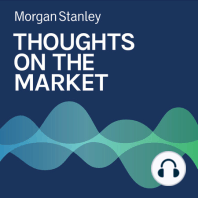4 min listen

2022 Global Economic Outlook, Pt. 2: Debates and Uncertainties
2022 Global Economic Outlook, Pt. 2: Debates and Uncertainties
ratings:
Length:
10 minutes
Released:
Nov 19, 2021
Format:
Podcast episode
Description
Andrew Sheets continues his discussion with Chief Global Economist Seth Carpenter on Morgan Stanley’s more optimistic economic outlook for 2022, what’s misunderstood and where it could be wrong.----- Transcript -----Andrew Sheets Welcome to Thoughts on the Market. I'm Andrew Sheets, Chief Cross Asset Strategist for Morgan Stanley Research.Seth Carpenter And I'm Seth Carpenter. I'm Morgan Stanley's Chief Global Economist.Andrew Sheets And on part two of the special episode of Thoughts on the Market, Seth and I will be continuing our discussion on the 2022 outlook for the global economy and how that outlook could impact markets in the coming year. It's Friday, November 19th at 5:00 p.m. in London.Seth Carpenter And if it's five pm in London, it's noon in New York.Andrew Sheets Seth, you speak to a wide variety of clients, and this topic of the supply chain, you know, keeps coming up in a variety of formats. It comes up in our financial discussions. It comes up in the popular press. Is there a part of this story that you think is poorly understood or maybe misunderstood, you know, amidst all this focus of supply chain stress?Seth Carpenter I think I'd point to two key areas where maybe there could be a little bit more attention focused. The first one, and I was sort of talking in these terms before, is the difference between the price level and inflation. Now, if I am at the store and I'm looking at milk on the shelf, all I care about is the price level itself: is milk more expensive than it was before? Is the price high? When the central bank, when investors look at prices, they're actually measuring inflation, the rate of growth of those prices. And I think that key distinction is one of the big parts here. If supply chains stop getting worse, then it seems like in general, at some point the price level should stop going up. It'd still be a high price and it'd still be unpleasant for consumers. But the inflation on that would end up being zero. And I think that difference between growth rates and price levels is one thing that probably deserves a little bit more scrutiny.Seth Carpenter And I think the second part is-- I'm going to use an economics type term here-- how non-linear some of these effects are. And so what do I mean there? If you think about the auto industry, which has been in the news a lot for having a shortage of microchips, for example. But suppose you had a car that had 95% of the parts already assembled, 5% were missing. That's not a car. That's spare parts. Suppose you had a hundred cars that were 95% done. In a linear version of the world, 95% of one hundred is 95 cars. But you still really just have a pile of spare parts at that point. And so it's not as though you get proportional reduction in output. You can get all of the output disrupted for one of just a few parts. I'm curious to see how it resolves on the other side. Does it turn out then that all of a sudden, we're faced with a glut of extra products because those few missing parts are now delivered and so all of a sudden that final assembly can get done and we have a lot. I don't know what the answer is. We've assumed that it's much smoother than that when things unwind, but there really is a lot of uncertainty here.Andrew Sheets So, Seth, the last 18 months have been really hard. But you know, you could maybe argue that for the Fed, its decisions have been somewhat easy. And we've seen the Fed and other central banks take extraordinary action. But, you know, now the Fed, the European Central Bank, you know, a lot of these central banks are now coming under a lot more pressure on the one side to say, you know, inflation's now picking up, you're making a mistake to, you know, the economy still not normal. It still needs a lot of support. How do you see those debates playing out? And how do you think some of that ultimately resolves itself next year?Seth Carpenter I mean, debate is exactly the right word, and I love to note to clients that my job used
Released:
Nov 19, 2021
Format:
Podcast episode
Titles in the series (100)
Mike Wilson: Weighing a Potential Fed Rate Cut by Thoughts on the Market